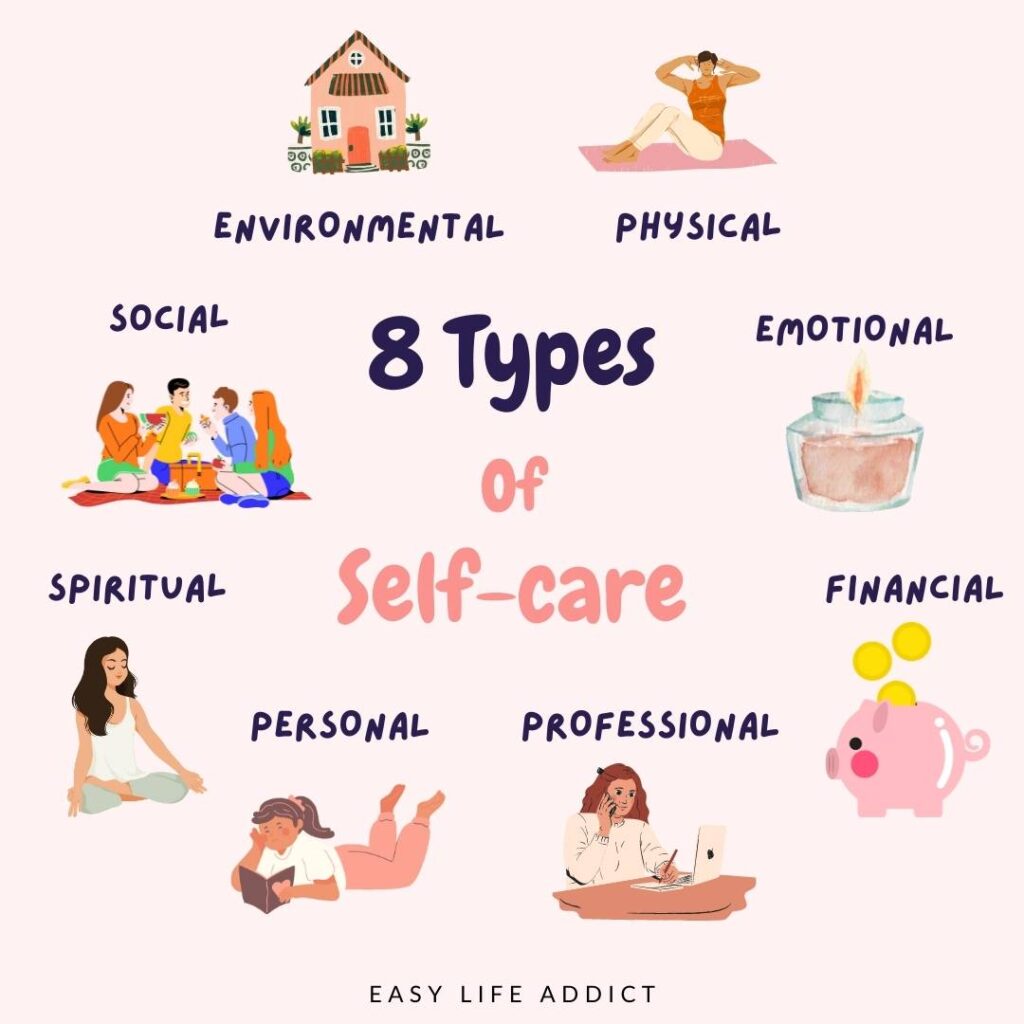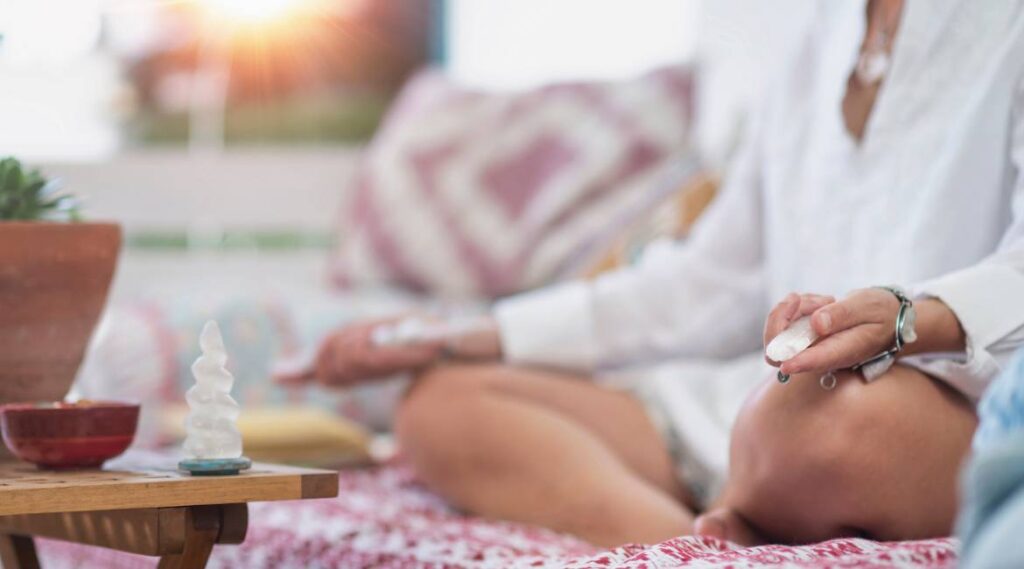The 8 Types of Self-Care and Why You Need Them All!
There’s no one-size-fits-all when it comes to self-care. We all have different needs, and what works for one person might not work for another. That’s why it’s important to know about the various types of self-care so that you can mix and match to create a routine that works for you. Keep reading to learn about all eight types of self-care and why you need them in your life!
This post may contain affiliate links. That means that if you click on a link and purchase something I recommend, I will receive a small commission at no extra cost to you. As an Amazon Associate, I earn from qualifying purchases. This helps keep my website up and running and is very appreciated. Thank you for your support! You can read my full disclosure policy here.
What is Self-care?
According to the World Health Organisation, self-care is “the ability of individuals, families and communities to promote health, prevent disease, maintain health, and to cope with illness and disability with or without the support of a healthcare provider”.
However, self-care can be seen in a broader sense, focusing more on maintaining a healthy lifestyle. This can be broken down into eight types of self-care that can help us relieve stress and keep the mind and body healthy, thereby helping to reduce physical and mental health conditions as well as reduce or relieve symptoms in those already suffering from such conditions.

The Benefits of Self-care:
All of us suffer from stress or anxiety at some point in our lives. This can come from multiple avenues, such as work pressures, strained relationships or financial hardship. Without taking time out, stress levels can build up and harm our health.
Incorporating self-care activities into our daily lives helps us to reduce stress, become more resilient and feel happier about ourselves. Research shows there are six main benefits of practising self-care regularly such as:
Better productivity – Once you prioritise self-care, you will focus more on what is important to you. This means that you are more likely to say NO to commitments that don’t serve you and say Yes to those that do. A clearer mind will also help you focus on completing the tasks at hand faster.
Improved resistance to disease – Participating in stress-relieving activities such as exercise or pampering treatments activates your parasympathetic nervous system. This system basically puts your body in REST and RESTORE mode, helping you decompress and thus reducing your risk of stress-related conditions.
Better physical health – Maintaining a healthy lifestyle, incorporating healthy eating habits, and exercising regularly are known to increase physical health. However, regular relaxation techniques can also reduce stress, improve mood and energy levels and boost the immune system.
Enhanced self-esteem – Just as exercise and good nutrition can positively impact self-esteem, so can regular self-care. Taking time out for yourself regularly sends a positive message to your subconscious. You will focus more on your abilities and have a more positive mindset. This will help those who suffer from negative self-talk and your critical inner voice.
Increased self-knowledge – By practising self-care, you begin to know yourself and understand what you love to do. Sometimes, this can spark a change in you that has been long needed, such as in your career or lifestyle.
More to give – It’s hard to be compassionate to others if you are feeling stressed yourself. Eventually, you will run out of juice and be swallowed up by all the negative thoughts running through your mind. By looking after yourself first and maintaining your mental well-being, you will become more resilient, ensuring you are better equipped to help others.
The 8 Types Of Self-Care
We all know that self-care is important, but what does it mean? And how do we make sure we’re doing it right? There are eight types of self-care: physical, emotional, financial, professional, personal, environmental, spiritual, and social. Keep reading to learn more about each type and how to incorporate them into your life!
Physical Self-care

Physical self-care is the process of incorporating activities into your life that promote physical health. Examples include:
Getting enough sleep – It’s recommended that we all should get around 8 hours of sleep each night. Getting a good night’s sleep enables our bodies to repair and fully rest for the day ahead. Getting enough sleep also reduces the risk of health conditions such as heart disease and increased illness duration.
Regular physical exercise – Exercise is one of the best ways to reduce weight and lower the risk of developing certain diseases, such as diabetes and high blood pressure. Exercise also releases those feel-good endorphins that improve mood and decrease feelings of anxiety and depression. Regular exercise can also contribute to better skin and boost self-esteem.
Eating a nutritious diet—Combined with physical activity, a nutritious diet can help maintain a healthy weight and reduce your risk of chronic conditions. However, you don’t have to completely disdain foods that you love. The trick is to have a balanced diet that incorporates all the nutritious food your body needs as well as a treat now and then.
If you love fast food, why not try making your own healthier versions at home? Also, be sure to drink at least 1-2 litres of water a day. Water is essential; it helps us stay hydrated and has many other health benefits.
Getting rest when needed – Rest isn’t about being lazy or avoiding work. It’s necessary for our health and to be at our best when working. Taking a break when needed has been shown to improve cardiovascular health and lower blood pressure. Regular breaks can make us enjoy our work more and become more productive.
Personal Self-care

Personal self-care is an activity that helps take care of our own physical and mental well-being. Examples include:
Getting to know yourself – Finding and knowing your true self helps to motivate you to resist bad habits and develop good ones. However, it’s not always a simple process; many people avoid it. Why not start a journal? Writing down your thoughts and feelings can help you reflect on difficult situations. The process can also help you find your inner voice and learn coping strategies for the future.
Doing activities that you enjoy – Enjoying a hobby can significantly reduce stress and anxiety. However, a creative hobby is even more healthy for the brain. Getting those creative juices flowing will reduce stress and promote critical thinking and problem-solving, leaving you feeling accomplished.
Setting goals – Having realistic goals is so important. Brake down those big goals into bite-size chunks that can easily be achieved. This will give you feelings of accomplishment and satisfaction and make it more likely that you will reach the bigger goal more quickly!
Professional Self-care

Professional self-care is related to your work environment. Examples include:
Time management – Good time management allows you to accomplish more in a shorter time frame. This reduces stress and leads to better focus and more career success. Planning plays a vital role in time management.
Firstly, you need to prioritise your workload and stop multitasking. Complete each task entirely before starting a new one. Secondly, cut off any distractions, and put away that mobile phone! Thirdly, accept your limitations and delegate smaller tasks to other colleagues if possible.
Boundaries and breaks – There are three types of boundaries we need in our lives: physical, emotional and mental. If we don’t set boundaries at work, we risk overworking, feeling vulnerable, and not having a good work-life balance.
Physical boundaries relate to our personal space. Do we allow others to hug us, or is a handshake more acceptable?
Emotional boundaries relate to your emotions. Do you allow other people’s emotions or beliefs to interfere with your attitudes or behaviour?
Mental boundaries refer to your thoughts, values and opinions. Are your opinions and thoughts valued in the workplace? Feeling valued in the workplace is essential for job satisfaction.
Learning new skills – Learning new skills is essential for helping you reach your career goals. A new skill can help reduce boredom, make you more adaptable, and keep your career options open. Learning also helps keep the mind healthy. It’s brain training!
Financial Self-care

Financial self-care relates to how we manage our finances. Ensuring we aren’t spending more than we earn is essential in maintaining our overall well-being. After all, financial problems are one of the leading causes of stress and anxiety. Ways we can achieve financial self-care include:
Maintaining a budget – In today’s society, people increasingly spend more on credit cards and live above their means. This, however, is a disaster waiting to happen. Get control of your finances and set up a budget that you can stick to. If you have never set up a budget, check out my step-by-step guide to creating one.
Saving money – Saving more for the future can help us become financially secure. How many of us can predict the future? Having a little nest egg can give us an emergency cushion for unexpected bills or situations. If you want to save for a special purchase or just have an emergency fund, then check the 24 things to quit buying to save money.
Paying bills on time – Make a list of all your bills and when they need to be paid. If possible, try moving all the payment dates to a day or two after payday. That way, you know how much money you have left to play with for the rest of the month.
Spiritual Self-care

Spiritual self-care is any practice that brings us closer to ourselves, to who we truly are. Examples include:
Spending time alone – Being alone is one of the best self-care practices. It forces you to face yourself, to be present at the moment and be mindful of your surroundings.
Meditation – Meditation is a great way to soothe and disconnect from negative thoughts. If you are new to medication, try listening to calming music, natural sounds or words of affirmation.
Journalling – Journalling is writing down all your feelings, thoughts and experiences. This helps us understand how we feel about a particular situation and a way of reflecting and learning coping strategies for the future. To learn more about journalling, check out these 90 inspirational journal prompts.
Spending time in nature – One of the best ways to reduce stress is to get out and about. I always find that walking or hiking outside helps me disconnect from the day and refocus my mind. Spending time in nature is also known to improve short-term memory, improve sleep and inspire creativity.
Social Self-care

Social self-care relates to maintaining healthy relationships. Examples include:
Having a support system – Having friends or family to rely on in times of need is important. However, you mustn’t rely on these people to decide for you. Instead, go to them for advice and comfort when needing to vent, but ensure all decisions are made by you only.
Healthy use of social media – When was the last time you had a social media purge? Adjusting your follow list on Social Media platforms will make a bigger change than you might think. Look at some of your social networks and think about who you want to be connected to. Do these accounts bring you joy, or do they bring out negative feelings? Find healthy sources that don’t trigger or impact you negatively.
Friends – Spending time with friends and family is one of the best ways to reduce stress, give us a purpose, and promote self-worth.
Environmental Self-care

Environment self-care involves having an organised, clean and safe living space. Examples include:
Safety – Feeling safe and secure in our own home is essential. It is the place where we wind down, heal, and rebuild. Make your home and surroundings a place of calm, a sanctuary where we can let go fully and embrace our true selves.
Healthy environment – Living in an uninspiring space can negatively impact most of our living habits. It can leave us feeling demotivated and stressed, leading to bad eating and lifestyle habits that affect our mood and behaviour. Many of us can’t change where we live, but we can change how we live. Try making positive changes to your living environment, even if that means adding motivational quotes or potted plants.
Organisation – Organising your home and living space can be just as important as doing self-care activities to look after your mental health. Imagine coming home from work after a stressful day and opening the door to a cluttered, messy space; it won’t help you unwind and relax. Clutter can also offer distractions; without realising it, it can make us less productive.
Emotional Self-care

Emotional self-care involves caring for your emotional needs by identifying how they are feeling and how to move forward. Examples include:
Stress management – Recognising when you are stressed is one of the first steps in stress management. The second is recognising what to do to relieve that stress! Are you someone who picks up that chocolate bar or glass of wine, or would you use up that negative energy on a run? The way we deal with stress in the long term will ultimately affect our health in the future. Taking a step back and understanding our actions when we are stressed will help us make more rational decisions that aren’t harmful.
Compassion – Many of us will give out a lot of ourselves to others who are struggling. However, this can quickly leave us feeling drained. We should all ensure we give ourselves compassion first; practising self-care is one of the best ways to do it. By doing this we become more resilient, giving us the to help others as and when needed without draining ourselves in the process.
Therapy – If things are getting on top of you or you are dealing with traumatised experiences, then speaking to a professional can help you make sense of your thoughts. Just like writing down your thoughts and feelings in a journal can help, saying out loud can also help release these negative feelings rather than bottling them up inside.
Final Thoughts
Self-care is extremely important for maintaining a healthy mind, body, and soul. When we value and look after ourselves, we are more likely to make healthier choices, which in turn improves our health and maintains a sense of well-being. Not all types of self-care will resonate with everyone, but I hope some of these examples will help improve your health and well-being and encourage you to make yourself your number one priority!
If you want to incorporate self-care into your daily routine, check out my related resources for everything you need to help maintain a healthy life balance!
Thanks so much for stopping by; I appreciate everyone who takes the time to read and make it to the end! I have lots of exciting new content in the next few weeks, so make sure you pop back to catch up!









